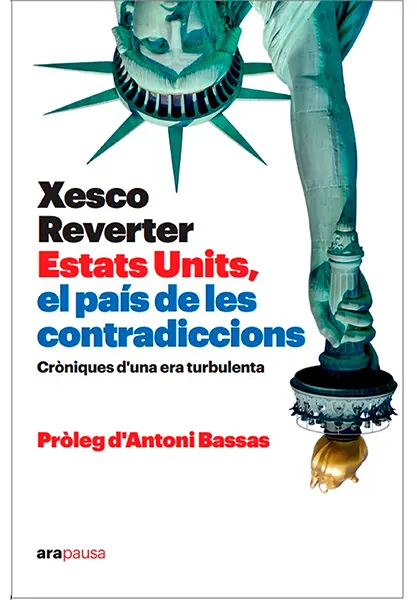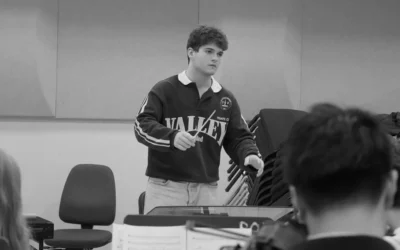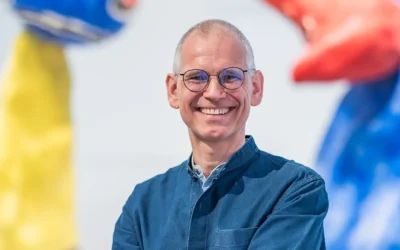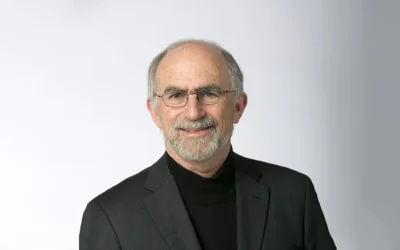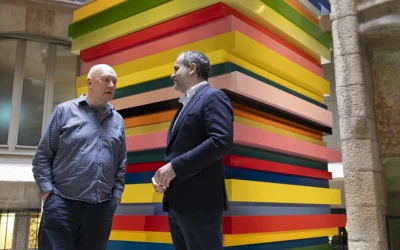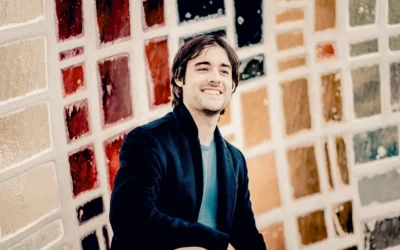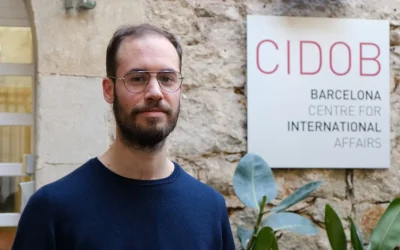Xesco Reverter: “The image we have of the United States is often connected to the president who is in the White House at the moment”
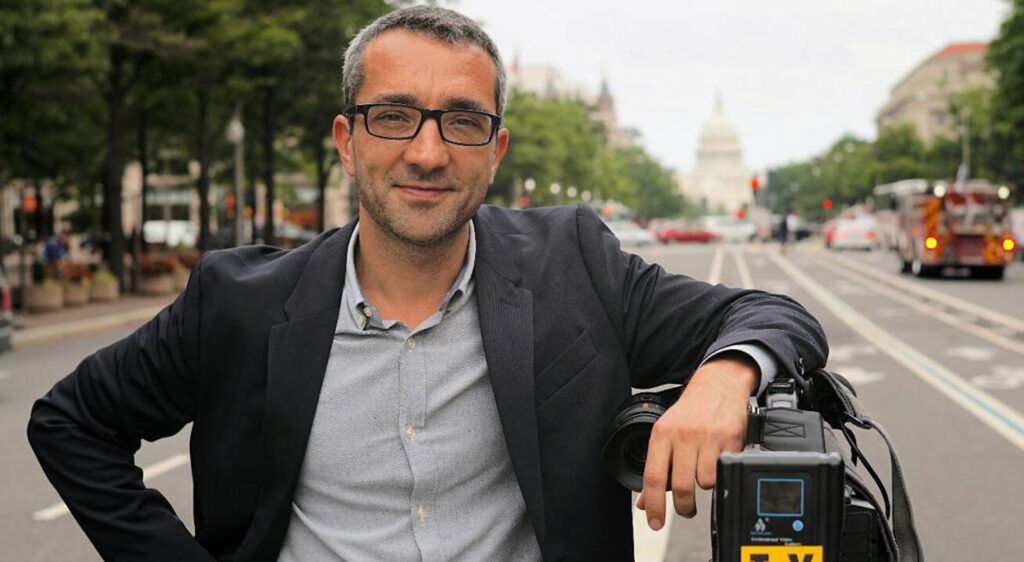
Halfway through 2017, Xesco Reverter (Barcelona, 1978) took over for Raquel Sans in the post of TV3’s correspondent in Washington, in the United States. The journalist landed on the continent of North America at a moment of change. Only a few months earlier, Donald Trump had become the president and the experts already intuited that there were going to be tumultuous times ahead. Nevertheless, Xesco Reverter could never have imagined the challenge that he would face in explaining one of the most turbulent periods the United States has experienced in recent decades to the viewers of Catalan public television.
Between 2017 and 2022, he went live to explain the attack on the Capital in 2021, the protests against the death of George Floyd, and Trump’s constant incendiary rhetoric. However, he was also witness to the contradictions, the schisms, and the crises that had been brewing in the country for years, such as structural racism, the prison system, the passion for weapons, and the consumption of opiates. Now he has once again settled back in Catalonia, and just published his book Estats Units, el país de les contradiccions [The United States, a country of contradictions] (Ara Llibres), which collects his experiences in America. On January 26, at six thirty in the afternoon, the journalist will be at the site of the Institut d’Estudis Nord-americans (c/ Via Augusta, 121, in Barcelona) to present the book along with journalist and writer Ismael Nafría. We will talk there.
In 2017, you landed in Washington at a moment of great changes. What do you remember about those first days?
When I arrived at our office there, it had only been a short while since Donald Trump had been named president of the United States. Everyone told me that they were expecting a roller coaster, but nobody was ready for what happened. At that time nobody was expecting that I would have to explain an assault on the United States Capital, for example. I was expecting a face paced challenge in an extremely complex country, made up of many different layers and full of subtle nuances. For the five years that I lived there, I found it fascinating to be able to discover and explain to the viewers all the shades of grey that I was discovering there.
Was the country you found what you were expecting?
Washington is a very interesting city, but it is also a bubble that does not represent the diversity of the United States very well. If I wanted to be a correspondent with more credibility and authority, I had to get out of the city and see the country. Luckily, TV3 has never been afraid of taking a chance on feature stories for the news, even if it required the Washington team to be out of town for a few days. As a correspondent, my obligation was to report on everything that happened involving the president, the US Congress and the Supreme Court. That said, I also knew that in order to covey a vision of the United States that was as complete as possible, I had to go out into the country to see what was happening beyond the politics.
 And you ran into a world of contradictions. Which of them stood out?
And you ran into a world of contradictions. Which of them stood out?
There are so very many. The most flagrant is the racial contradiction. More than 200 years ago, the United States drew up a constitution that made it clear that all men were equal, and therefore, had the same rights. Nevertheless, in that same document, it stated that people of color counted three fifths of a white person. Two and a half centuries later, I think there are many cases in which people of color continue to be second class citizens. It is an issue that I kept running into. When I did a report on health care, the African-American community was the most likely to suffer harm. The same happened in education. Laws have had been abolishing racial segregation since the 1960s, but today it is still a very segregated nation. For example, in Washington, I lived in a neighborhood were nearly 100% of my neighbors were white. On the other side of the city, it was the other way around.
Despite all that, the United States is often seen as the land of opportunity.
It is a myth that is partially true. That said, it is true that which zip code you are born in determines a lot about your future. It is not the same to live in a poor neighborhood, with a broken family, and making up part of a minority as it is to live in a rich, white neighborhood. It happens in Europe too, but in the United States it is more accentuated. It is a country full of contradictions, some of which are deeply rooted. For example, every year, 45,000 people die due to firearms, because it is the only country that allows its citizens to have weapons in a generalized way. There are also 100,000 deaths each year due to drugs. When we look at the United States from the outside, we often ask, how can that be?
Did you also find contradictions at a political level?
Yes. The American political system has become twisted. The United States Constitution was a pioneer for the entire world because it clearly defined the separation of powers. In recent years however, the country has undergone scenarios that put its democratic health to the test. On one side, we have a Supreme Court that is not very representative of the people, heavily anchored on the right, and which issues sentences on issues such as abortion that are very distant from the will of the majority of the citizens. On the other hand, it is shocking to see the Republican Party’s capability to block any sort of legislative initiative. In short: there is an awful polarization of politics.
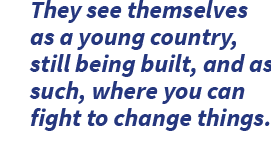 Given all of that, what image do you think the Catalan society has of the United States?
Given all of that, what image do you think the Catalan society has of the United States?
That is a difficult question to answer. The image of the United States that we have from outside depends a lot on the person that is occupying the White House. In the period of George [W.] Bush and the war in Iraq, for example, its prestige dropped to its lowest level. With the presidency of Barack Obama, on the other hand, it rocketed up to historic maximums. The truth is that the president was able to become more popular abroad than he was in his own country. With Trump think shot down again. The opinion we have of the United States is formed by the actions of each president. Furthermore, in Spain, there has always been a certain touch of anti-Americanism, perhaps due to Franco’s alliance with the United States. When anyone is able to consider the United States for a couple of minutes and can overcome the barriers of the clichés and current affairs, they notice that they have a great culture, a phenomenal university system, exceptional natural landscapes, etc.
It is a country with a strong sense of patriotic pride. How do you explain that?
The United States practically makes up an entire continent. Since all its citizens speak English, we often make the mistake of grouping them together. However, within the country there are an enormous amount of nationalities and characters. And it is true: everyone is proud to be an American. They see themselves as a young country, still being built, and as such, where you can fight to change things. A spirit of optimism reigns there that drives them to move forward every day. They feed on their historical milestones, such as being the first humans on the moon; and on their myths, like that of the self-made entrepreneur. In Europe, there is a more pessimistic outlook. People believe that the countries are too old and too established to reshape them completely.
On January 26, you will be at the IEN to present your first book. What led you to publish it?
Over these five years, the language of television forced me to summarize great events and stories into news pieces that were just a few minutes long. I wanted to recover part of the material I had and explain it in more relaxed, less urgent manner in a book. I calmly examine news stories such as the insurrection at the Capital, or the rise of trumpism, and even the structural cracks of the country, such as drugs, prisons, oil, and firearms.
Estats Units, el país de les contradiccions
Cròniques d’una era turbulenta
Xesco Reverter
